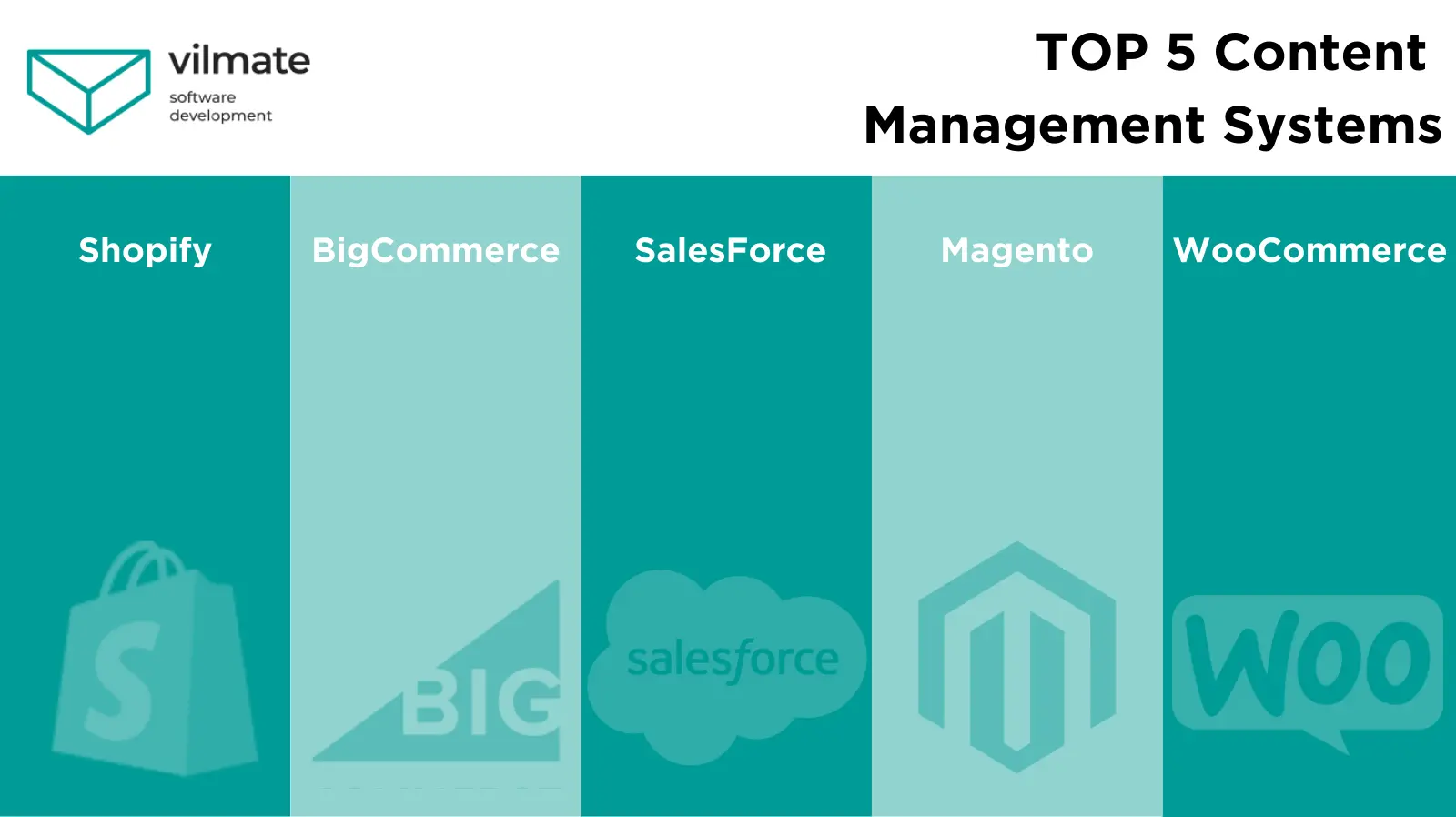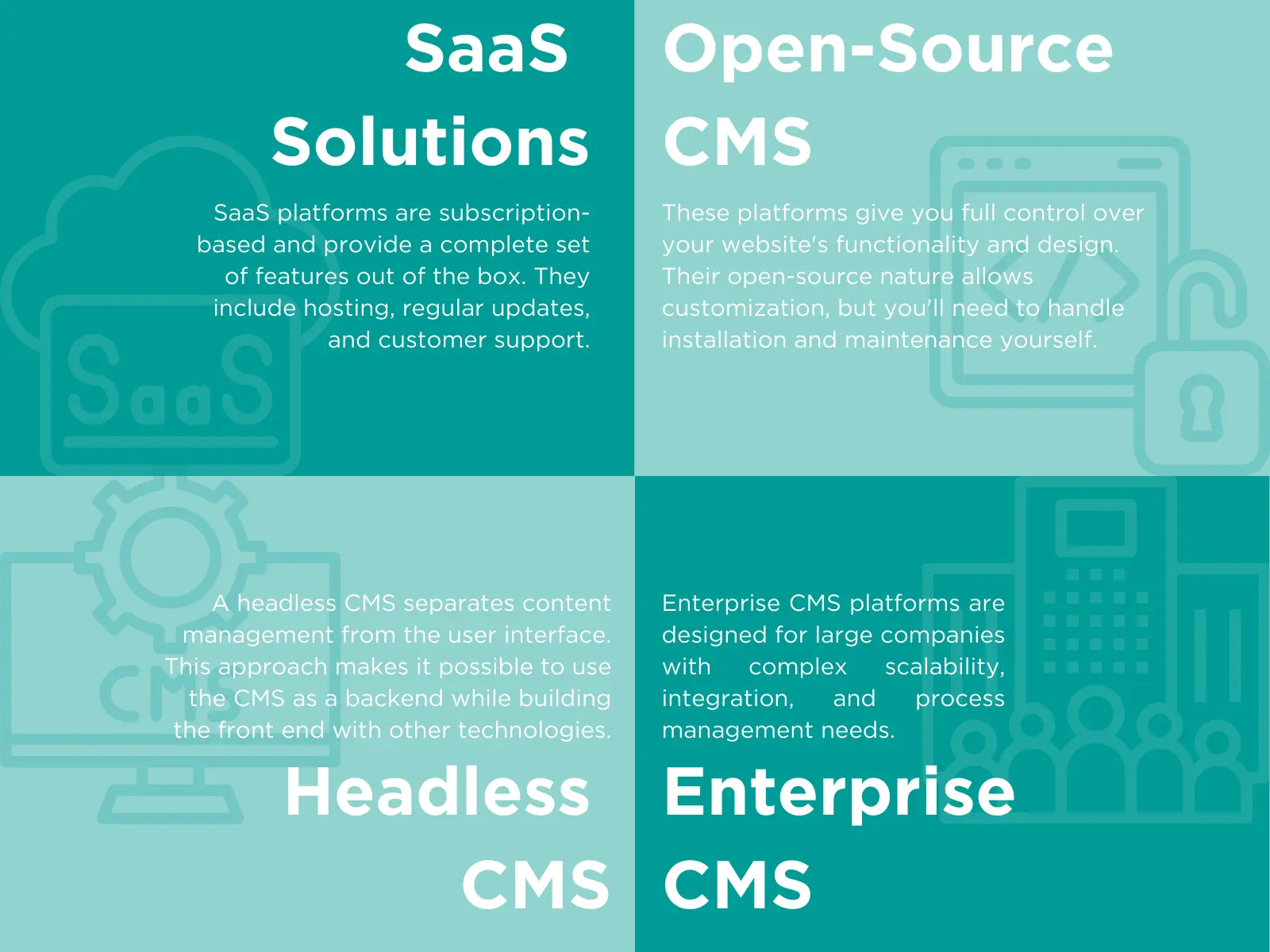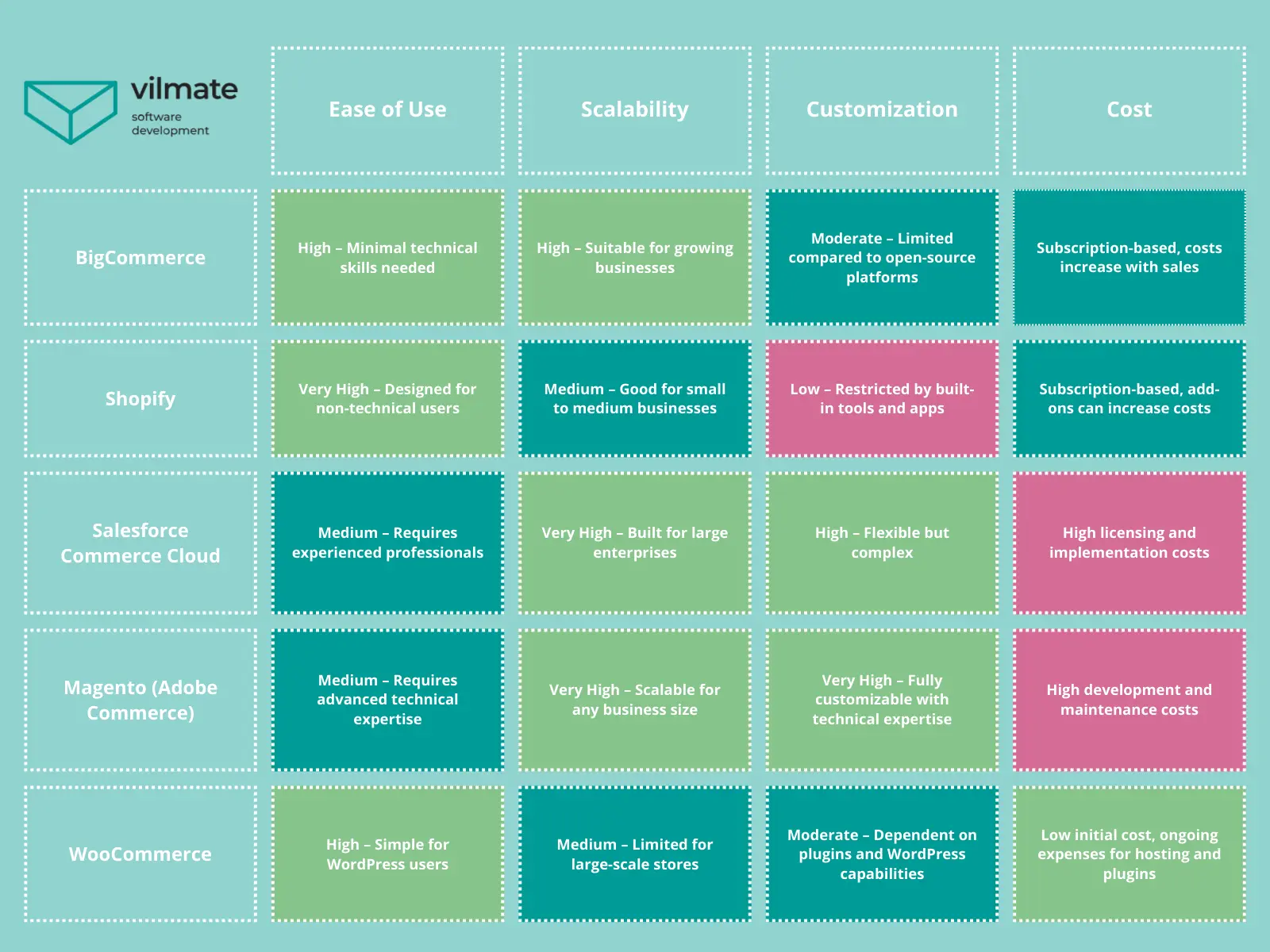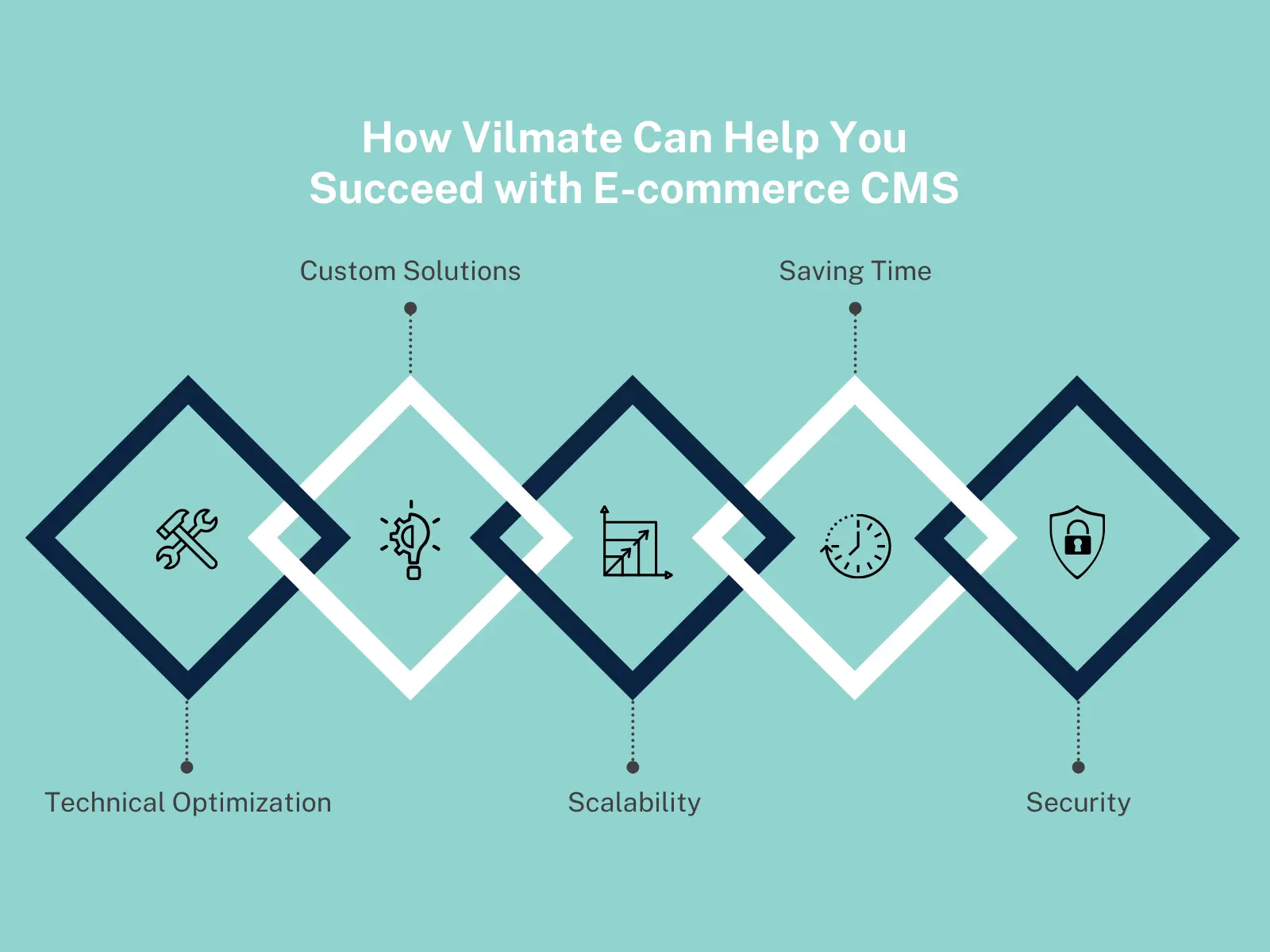In today's world, a website is essential for the growth of any business. The competition in e-commerce is intense, so your online store needs to stay modern, efficient, and easy to use. The Content Management System (CMS) it runs on is a key factor in its success. The right CMS affects not just the design and features but also your website's performance, ease of management, and scalability.
Choosing a CMS is important not only when building a new website. If your current site can't handle traffic, is difficult to manage, or limits your growth, it may be time to switch to a better platform.

In this article, we'll compare popular CMS platforms for e-commerce to help you find the one that best meets your needs and goals. If you need help creating or migrating your website, the Vilmate team is here to turn your ideas into reality.
What Makes E-Commerce CMS Platforms Different, and What Should They Offer?
E-commerce Content Management Systems (CMS) are designed to sell products and services, setting them apart from standard platforms. They include features that help online stores run smoothly, improve conversion rates, and provide a better shopping experience for customers. Let's look at the key features and benefits every e-commerce CMS should offer:
- Payment System Integration. A quality CMS should support various payment options, including popular systems like PayPal, Stripe, and Apple Pay.
- Product Catalog Management. Product management should be simple and efficient. An e-commerce CMS needs tools for adding, editing, and organizing products. Key features include product attributes, search filters, and options for variable products (like different sizes or colors).
- Shipping Integration. A strong e-commerce CMS includes built-in tools for calculating shipping costs, working with courier services, and tracking deliveries. These features make logistics easier for store owners and provide a smoother experience for customers.
- Scalability. An e-commerce CMS should grow with your business. It needs to handle a large product catalog, high website traffic, and the addition of new features, like international sales or affiliate programs.
- SEO Tools. SEO features are essential for improving your store's visibility in search engines. These include managing meta tags, customizing URLs, creating XML sitemaps, and optimizing page load speed.
- Analytics and Reporting. A good CMS provides clear and detailed analytics. It should offer insights into sales, customer behavior, and marketing campaign performance. This data helps you make smarter business decisions.
- Security. Strong security is necessary since e-commerce platforms process sensitive information like payments and customer data. Key features include SSL certificates, protection against cyberattacks, regular updates, and data backups.
- Integration with Other Tools. The CMS should easily connect with external systems like CRMs, marketing tools, ERP platforms, and other services. These integrations help automate and streamline business operations.
- Multichannel Sales Support. Many modern e-commerce CMS platforms allow you to manage sales on marketplaces like Amazon and eBay and on social media platforms like Instagram and Facebook, helping you reach more customers.
With so many CMS platforms available, you might wonder why so many options exist.
The answer is simple: every business is unique. Different companies need different features to meet their goals. Various e-commerce CMS platforms have been created to meet these diverse needs.
Types of E-Commerce CMS
E-commerce CMS platforms are grouped into several types based on their features, management approach, and usage model. Let's take a look at the main categories:

1. SaaS Solutions (Software as a Service)
SaaS platforms are subscription-based and provide a complete set of features out of the box. They include hosting, regular updates, and customer support.
Examples: Shopify, BigCommerce.
Advantages:
- Easy to use — you don't need technical skills.
- Fast setup and quick store launch.
- Built-in security and automatic updates.
- Reliable and scalable thanks to cloud infrastructure.
Disadvantages:
- Limited customization options.
- Dependence on the provider (you can't move your site to another host).
- Monthly fees that increase as your sales grow.
2. Self-Hosted Open-Source CMS
These platforms give you full control over your website's functionality and design. Their open-source nature allows customization, but you'll need to handle installation and maintenance yourself.
Examples: WooCommerce (a WordPress plugin) and Magento (Adobe Commerce).
Advantages:
- Highly flexible and fully customizable.
- Access to a wide variety of plugins, modules, and themes.
- No recurring fees for the CMS (though hosting and maintenance costs still apply).
Disadvantages:
- Requires technical skills to set up, configure, and manage.
- You are responsible for updates and security.
- Additional expenses may be needed for developers and ongoing support.
3. Headless CMS
A headless CMS separates content management from the user interface. This approach makes it possible to use the CMS as a backend while building the front end with other technologies.
Examples: Contentful, Strapi, Commerce Layer.
Advantages:
- High performance and flexibility.
- Easily adapts to different devices and interfaces.
- Perfect for omnichannel strategies, letting you manage a website and app from one system.
Disadvantages:
- Requires a skilled development team.
- Higher initial costs for setup and integration.
- No pre-built user interface included.
4. Enterprise CMS
Enterprise CMS platforms are designed for large companies with complex scalability, integration, and process management needs.
Examples: Adobe Commerce (formerly Magento Enterprise), Salesforce Commerce Cloud.
Advantages:
- Customizable to fit unique business processes.
- Reliable and capable of handling high-performance demands.
- Includes advanced tools for analytics, marketing automation, and managing large amounts of data.
Disadvantages:
- Higher costs for implementation and maintenance.
- Longer time needed for setup and integration.
- Requires professional developers and administrators.
The best CMS for your business depends on your budget, specific needs, technical expertise, and long-term goals. With these categories in mind, let's explore the top options in each group.
Top 5 CMS Platforms for E-Commerce Websites: Vilmate's Picks
Choosing the right CMS is key to creating a successful online store. At Vilmate, we have years of experience working with different platforms. This knowledge allows us to recommend the best options and customize them to meet your specific needs.

Here are our top 5 e-commerce CMS platforms, with an overview of their features, benefits, and possible drawbacks.
1. BigCommerce: A Powerful Solution for Growing Businesses
BigCommerce is a cloud-based SaaS platform designed for businesses that want to scale quickly. It's easy to use and offers features that minimize the need for complex technical work. The platform is popular with companies focused on growing sales rather than managing infrastructure. Home and garden products are the top-selling category on BigCommerce, making up 15.5% of all sales.
Key Features:
- Supports a large number of products and categories.
- Includes built-in tools for SEO and marketing.
- Integrates with shipping services and payment systems.
- Offers advanced reporting and analytics.
Pros:
- User-friendly, even for non-technical users.
- Scales easily as your business grows.
- Supports sales on marketplaces and social media platforms.
Cons:
- Less customization compared to open-source platforms.
- Costs can rise as your sales increase.
- Smaller selection of plugins and themes than some competitors.
Best For: Medium and large businesses that want to scale quickly without heavy technical investment.
2. Shopify: Simple and Functional
Shopify is a flexible SaaS platform that's become a go-to choice for quickly building online stores. With a 5.5% market share, it's one of the most popular CMS platforms. Shopify provides ready-made templates, numerous apps, and easy integrations, allowing you to launch a store in just a few days. It's perfect for businesses that value ease of use and are comfortable working with predefined features.
Key Features:
- A wide variety of pre-designed templates.
- Support for multichannel sales (marketplaces and social media).
- Built-in tools for product management and analytics.
- Seamless integration with popular payment systems.
Pros:
- Easy to set up and use.
- Reliable with regular updates.
- Access to a large library of apps and add-ons.
Cons:
- Many advanced features require paid apps.
- Difficult to migrate to other platforms.
- Limited customization options for larger or more complex projects.
Best For: Small and medium-sized businesses that want to launch a store with minimal effort and hassle quickly.
3. Salesforce Commerce Cloud: The Choice for Industry Leaders
Salesforce Commerce Cloud is a powerful platform for large retailers and global enterprises. It works seamlessly with the Salesforce ecosystem, including CRM, analytics, and marketing tools, making it a comprehensive solution for managing customer experiences.
Key Features:
- Tools for personalizing the shopping experience.
- Integration with Salesforce CRM and marketing platforms.
- Support for multichannel sales.
- High performance for large-scale e-commerce operations.
Pros:
- Advanced analytics and automation features.
- Extensive customization options.
- Strong security and reliable customer support.
Cons:
- High licensing costs.
- Requires an experienced team for setup and management.
- Implementation can take longer compared to other platforms.
Best For: Large businesses with a strong focus on personalization, integration, and scalability.
4. Magento: Unlimited Flexibility
Magento is a powerful open-source platform that allows you to create fully customized e-commerce solutions. Its flexibility and scalability suit small and large enterprises with unique needs. Magento holds a 2.32% share of the global e-commerce platform market.
Key Features:
- Supports large product catalogs and complex inventory systems.
- Advanced tools for managing discounts and promotions.
- Integration with international payment systems and multilingual support.
- Access to a wide range of plugins and themes.
Pros:
- Complete control over functionality and design.
- Handles large amounts of data with ease.
- Perfect for businesses targeting international markets.
Cons:
- High development and maintenance costs.
- Requires strong technical expertise or a professional team.
- Needs regular updates for security and module compatibility.
Best For: Businesses that need maximum flexibility and are ready to invest in custom solutions.
5. WooCommerce (WordPress): For Small and Medium Businesses
WooCommerce is a powerful plugin for WordPress that transforms a website into a full-fledged online store. Its popularity stems from its ease of use, active community, and affordability. WooCommerce is an ideal choice for entrepreneurs who are already using WordPress.
Key Features:
- Full compatibility with WordPress functionality.
- A wide range of themes and plugins.
- Easy integration with SEO tools.
- Support for local payment systems.
Pros:
- Low startup costs.
- Easy to manage and highly flexible.
- Active community and extensive documentation.
Cons:
- Limited scalability for larger stores.
- Dependence on the quality of third-party plugins.
- Requires regular updates and security monitoring.
Best For: Small stores, startups, and entrepreneurs working with limited budgets.
Conclusion
Modern e-commerce CMS platforms like BigCommerce, Shopify, and WooCommerce may seem easy to set up. They come with user-friendly interfaces and a variety of built-in tools. However, creating a successful online store isn't just about picking a design and adding products. Adapting the platform's features to your specific needs is important to ensure your business grows.

Why does professional help matter?
- Technical Optimization. Even simple platforms like BigCommerce require expertise to optimize for fast loading speeds, SEO performance, and mobile compatibility. Without proper setup, your website might frustrate customers and reduce sales.
- Custom Solutions. Technical skills and programming are essential if you need more than basic functionality—such as integrating with CRM systems, creating advanced discount programs, or designing a unique user experience.
- Scalability. As your business grows, the basic setup may struggle to handle increased traffic, more products, or higher order volumes. We'll ensure your platform is ready to scale with your business.
- Saving Time. Setting up an online store, even on a straightforward platform, can be time-consuming—especially if you're new to it. Letting professionals handle it allows you to focus on running your business.
- Security. Online stores handle sensitive customer data, including payments. We ensure your site meets security standards and protects your customers' personal information.
At Vilmate, we specialize in getting the most out of any CMS platform. We'll help you choose and customize the system to fit your unique business needs. Our services include:
- Comprehensive CMS setup, including technical and performance optimization.
- Integration with external tools like CRM, ERP, and marketing platforms.
- Omnichannel support to create a seamless shopping experience for your customers.
- Custom design and feature development to make your store stand out.
- Ongoing site support and enhancements after launch.
- Migration from your current platform if it no longer meets your requirements.
We don't just build online stores—we create powerful tools for business growth. Contact us today to discuss your project!




